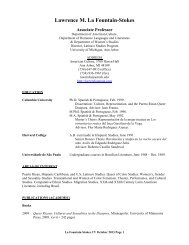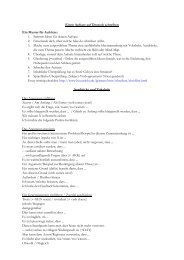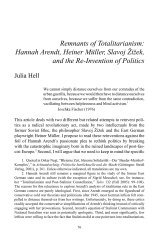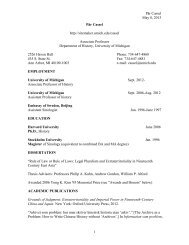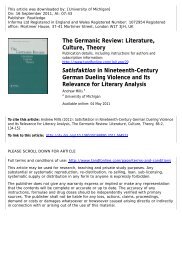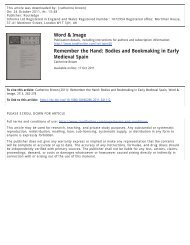Making History Personal: Constantine Cavafy and the Rise of Rome
Making History Personal: Constantine Cavafy and the Rise of Rome
Making History Personal: Constantine Cavafy and the Rise of Rome
Create successful ePaper yourself
Turn your PDF publications into a flip-book with our unique Google optimized e-Paper software.
Frier, “<strong>Making</strong> <strong>History</strong> <strong>Personal</strong>,” page 7<br />
“The Glory <strong>of</strong> <strong>the</strong> Ptolemies” (1896/1911), “Greek Since Ancient Times” (1927, unfinished), “In<br />
a Large Greek Colony, 200 B.C.” (1928), <strong>and</strong> “In <strong>the</strong> Year 200 B.C.” (1931). Prescient warn-<br />
ings about <strong>the</strong> mounting threat from <strong>the</strong> West went entirely unheeded in this smug environment:<br />
“Agelaus” (1932, unfinished). 22<br />
The decisive Roman military victories over Philip V <strong>of</strong> Macedon at <strong>the</strong> battle <strong>of</strong> Cynos-<br />
cephelae in 197, over Antiochus III <strong>and</strong> <strong>the</strong> Seleucid Empire at Magnesia in 190, <strong>and</strong> over Per-<br />
seus <strong>of</strong> Macedon at Pydna in 168 are <strong>the</strong> direct subject <strong>of</strong> “The Battle <strong>of</strong> Magnesia” (1913) <strong>and</strong><br />
“For Antiochus Epiphanes” (1911?/1922). <strong>Cavafy</strong>’s main <strong>the</strong>me in both poems—<strong>and</strong> <strong>the</strong> sole<br />
explanation he <strong>of</strong>fers for <strong>the</strong> defeats—is <strong>the</strong> inability <strong>of</strong> <strong>the</strong> great Hellenistic kings to cooperate<br />
23<br />
in common defense against a common foe. The first poem shows Philip V choosing to feast<br />
despite <strong>the</strong> news <strong>of</strong> his rival’s disastrous defeat at Magnesia: “He remembers how <strong>the</strong>y mourned<br />
in Syria, <strong>the</strong> agony / <strong>the</strong>y felt, when Macedonia <strong>the</strong>ir mo<strong>the</strong>rl<strong>and</strong> was smashed to bits.— / Let <strong>the</strong><br />
feast begin. Slaves: <strong>the</strong> music, <strong>the</strong> lights!” In <strong>the</strong> second poem, set in 169, Antiochus IV Epiphanes<br />
is too terrified even to respond aloud when a young Antiochene passionately implores<br />
him to aid Perseus <strong>and</strong> <strong>the</strong> Macedonians, since “Some eavesdropper might / go <strong>and</strong> repeat something—<br />
Anyway, as expected, / at Pydna <strong>the</strong>re swiftly came <strong>the</strong> horrible conclusion..” 24<br />
There follows a long series <strong>of</strong> poems describing what <strong>Cavafy</strong> interprets as dislocation <strong>and</strong><br />
despair at all levels <strong>of</strong> <strong>the</strong> Hellenistic world as it comes to grips with <strong>the</strong> new political <strong>and</strong> mili-<br />
tary reality. What initially seems odd about <strong>the</strong>se poems is that <strong>the</strong>y shift attention northward,<br />
away from Egypt, to <strong>the</strong> vast Seleucid Empire (stretching, in <strong>the</strong> early second century BCE, from<br />
Palestine <strong>and</strong> eastern Anatolia clear to Persia). By contrast, <strong>the</strong> Ptolemies, whose dynastic<br />
22<br />
“Agelaus” derives directly from a famous speech at a conference in Naupactus, 217, as rendered in Polybius,<br />
5.103-105 (e.g., 104.10-11: “For if once you wait for <strong>the</strong>se clouds that loom in <strong>the</strong> west to settle on Greece, I very<br />
much fear lest we may all <strong>of</strong> us find <strong>the</strong>se truces <strong>and</strong> wars <strong>and</strong> games at which we now play, so rudely interrupted<br />
that we shall be fain to pray to <strong>the</strong> gods to give us still <strong>the</strong> power <strong>of</strong> fighting in general with each o<strong>the</strong>r <strong>and</strong><br />
making peace when we will, <strong>the</strong> power, in a word, <strong>of</strong> deciding our differences for ourselves.”). On <strong>the</strong> importance<br />
to <strong>Cavafy</strong> <strong>of</strong> 200 BCE, see Mendelsohn, Collected Poems (2009) 455: “a moment immediately preceding <strong>the</strong> culminating<br />
Roman defeats <strong>of</strong> Hellenistic Greek monarchs, <strong>and</strong> <strong>the</strong>refore a date that marks <strong>the</strong> imminent absorption <strong>of</strong> <strong>the</strong><br />
Greek world by <strong>Rome</strong>.” There is a similar hint <strong>of</strong> warning in “Poseidonians” (1906), a moving lament on <strong>the</strong> gradual<br />
loss <strong>of</strong> Hellenic identity among <strong>the</strong> Greeks <strong>of</strong> Magna Graecia; Poseidonia (Paestum) was transformed into a<br />
Latin colony in 273 BCE for having penalty sided against <strong>the</strong> Romans during <strong>the</strong> Pyrrhic War (280-275 BCE).<br />
23<br />
See Pinchin, Alex<strong>and</strong>ria Still (1977) 44-49, who, however, somewhat misunderst<strong>and</strong>s <strong>the</strong> nature, <strong>and</strong> underestimates<br />
<strong>the</strong> extent, <strong>of</strong> Roman imperialism in <strong>the</strong> Eastern Mediterranean. Still, nei<strong>the</strong>r here nor elsewhere does<br />
<strong>Cavafy</strong> blame <strong>the</strong> Hellenistic defeat on <strong>the</strong> Romans, who were, after all, just acting like Romans.<br />
24<br />
Both incidents are entirely fictional, mainly illustrating <strong>Cavafy</strong>’s own diagnosis <strong>of</strong> <strong>the</strong> situations. On “For<br />
Antiochus Epiphanes,” see my conclusion.






